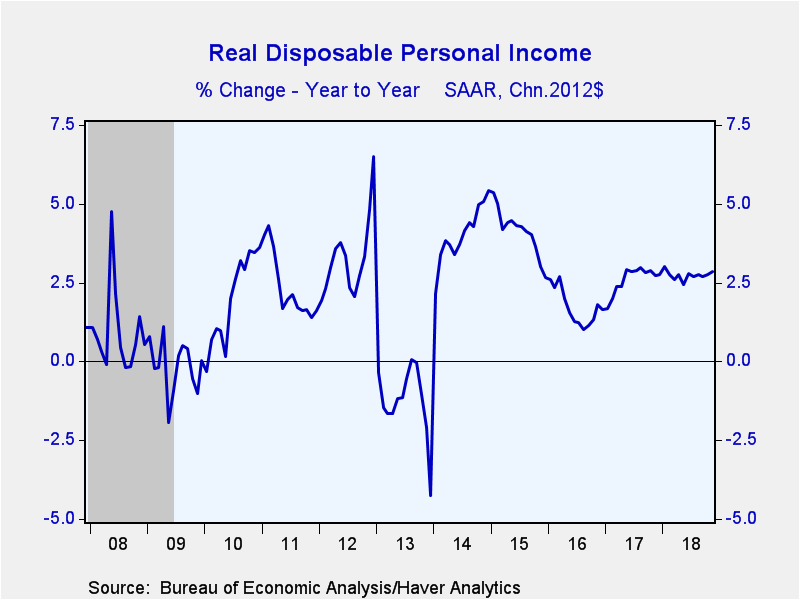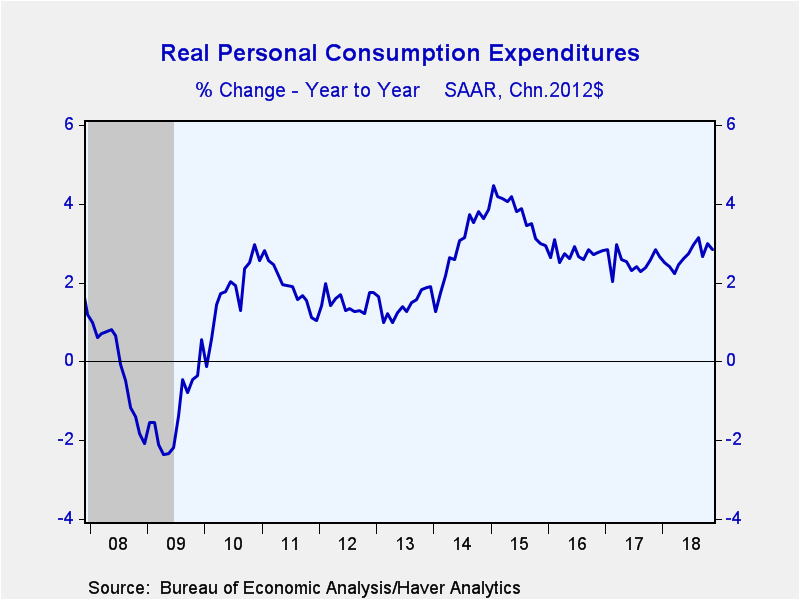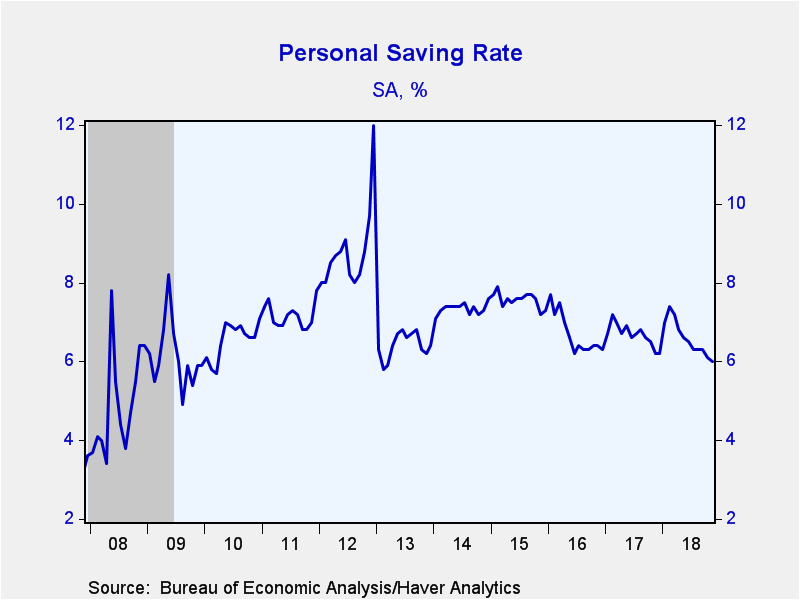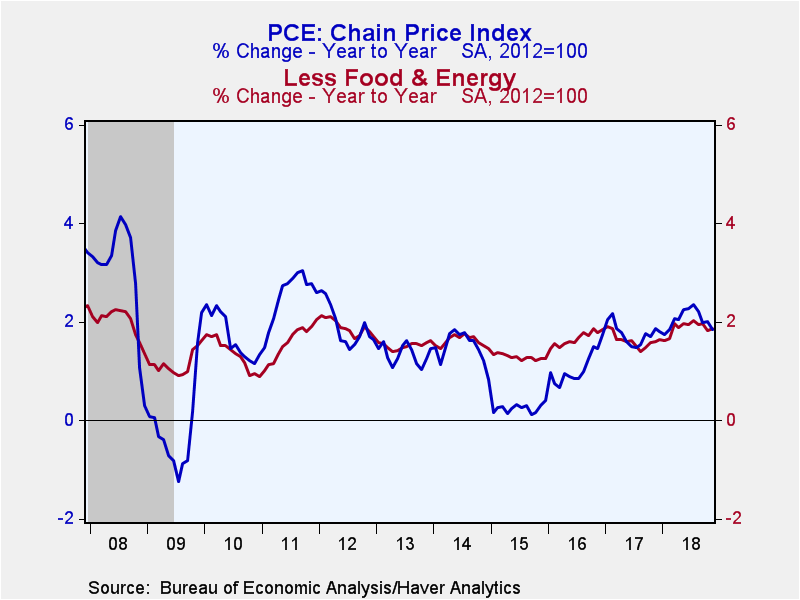 Global| Dec 21 2018
Global| Dec 21 2018U.S. Personal Income and Spending Gains Slow; Pricing Power Is Weak
by:Tom Moeller
|in:Economy in Brief
Summary
Personal income rose 0.2% during November (4.2% y/y) following an unrevised 0.5% October increase. A 0.3% gain was expected in the Action Economics Forecast Survey. Leading last month's rise was a 1.0% hop (5.3% y/y) in proprietors' [...]
Personal income rose 0.2% during November (4.2% y/y) following an unrevised 0.5% October increase. A 0.3% gain was expected in the Action Economics Forecast Survey. Leading last month's rise was a 1.0% hop (5.3% y/y) in proprietors' income which came after a 1.3% jump. Wages & salaries rose a lessened 0.2% (4.2% y/y), the weakest rise in six months. Income from assets held steady (3.5% y/y) after a 0.3% rise, reflecting a 0.4% dividend decline (+3.8% y/y) and a 0.3% gain (3.2% y/y) in interest income. Rental income increased 0.5% (4.8% y/y), the same as during October. Transfer payments edged 0.1% higher (5.2% y/y) reflecting a 0.4% decline (+5.7% y/y) in social security payments. Medicare receipts rose 0.9% (7.5% y/y) but Medicaid income inched just 0.1% higher (4.8% y/y). Veterans benefits rose 0.4% (10.9% y/y) while unemployment insurance benefits eased 0.4% (-16.7% y/y).
Disposable personal income gained 0.2% (4.7% y/y) following a 0.5% increase. When adjusted for higher prices, disposable income also rose 0.2% (2.8% y/y).
Personal consumption expenditures improved by a lessened 0.4% last month (4.7% y/y) after a 0.8% increase. A 0.3% rise had been expected. Adjusted for higher prices, personal outlays rose 0.3% (2.8% y/y). Real durable goods outlays increased 0.9% (3.8% y/y) led by a 1.9% rise (8.9% y/y) in recreational goods & vehicles. Home furnishings & appliance buying increased 1.3% (4.1% y/y) but motor vehicle expenditures declined 0.4% (-2.2% y/y). Real outlays on nondurable goods increased 0.6% (3.2% y/y) as fuel outlays edged 0.1% higher (-0.8% y/y). Clothing spending jumped 1.6% (4.6% y/y) and spending at restaurants rose 0.3% (2.7% y/y). Real services outlays gained a lessened 0.2% (2.6% y/y). Spending on housing & utilities rose a steady 0.6% (2.4% y/y) while financial services & insurance payments gained 0.4% (0.9% y/y). Recreation services spending decreased 0.8% (+1.4% y/y) while spending at restaurants fell 0.7% (+3.5% y/y). Health care outlays rose 0.3% (2.9% y/y).
The personal savings rate eased to 6.0%, the lowest level since March 2013. It has been falling steadily since the February high of 7.4%. The level of personal savings increased a paltry 1.7% y/y.
The personal consumption chain price index rose 0.1% (1.8% y/y) after a 0.2% rise. The index excluding food & energy also rose 0.1% (1.9% y/y) for a second month.
The personal income and consumption figures are available in Haver's USECON database with detail in the USNA database. The Action Economics figures are in the AS1REPNA database.
| Personal Income & Outlays (%) | Nov | Oct | Sep | Nov Y/Y | 2017 | 2016 | 2015 |
|---|---|---|---|---|---|---|---|
| Personal Income | 0.2 | 0.5 | 0.2 | 4.2 | 4.4 | 2.6 | 4.9 |
| Wages & Salaries | 0.2 | 0.4 | 0.3 | 4.2 | 4.6 | 2.9 | 5.1 |
| Disposable Personal Income | 0.2 | 0.5 | 0.2 | 4.7 | 4.4 | 2.8 | 4.4 |
| Personal Consumption Expenditures | 0.4 | 0.8 | 0.1 | 4.7 | 4.3 | 3.8 | 4.0 |
| Personal Saving Rate | 6.0 | 6.1 | 6.3 | 6.2 (Nov.'17) |
6.7 | 6.7 | 7.6 |
| PCE Chain Price Index | 0.1 | 0.2 | 0.1 | 1.8 | 1.8 | 1.1 | 0.3 |
| Less Food & Energy | 0.1 | 0.1 | 0.2 | 1.9 | 1.6 | 1.7 | 1.3 |
| Real Disposable Income | 0.2 | 0.3 | 0.1 | 2.8 | 2.6 | 1.7 | 4.1 |
| Real Personal Consumption Expenditures | 0.3 | 0.6 | -0.0 | 2.8 | 2.5 | 2.7 | 3.7 |
Tom Moeller
AuthorMore in Author Profile »Prior to joining Haver Analytics in 2000, Mr. Moeller worked as the Economist at Chancellor Capital Management from 1985 to 1999. There, he developed comprehensive economic forecasts and interpreted economic data for equity and fixed income portfolio managers. Also at Chancellor, Mr. Moeller worked as an equity analyst and was responsible for researching and rating companies in the economically sensitive automobile and housing industries for investment in Chancellor’s equity portfolio. Prior to joining Chancellor, Mr. Moeller was an Economist at Citibank from 1979 to 1984. He also analyzed pricing behavior in the metals industry for the Council on Wage and Price Stability in Washington, D.C. In 1999, Mr. Moeller received the award for most accurate forecast from the Forecasters' Club of New York. From 1990 to 1992 he was President of the New York Association for Business Economists. Mr. Moeller earned an M.B.A. in Finance from Fordham University, where he graduated in 1987. He holds a Bachelor of Arts in Economics from George Washington University.
More Economy in Brief
 Global| Feb 05 2026
Global| Feb 05 2026Charts of the Week: Balanced Policy, Resilient Data and AI Narratives
by:Andrew Cates










